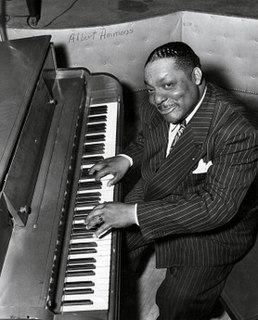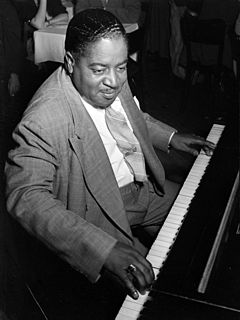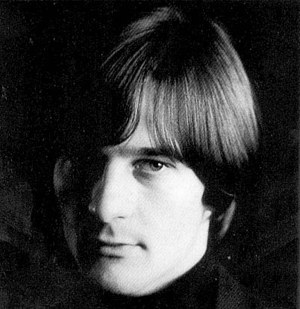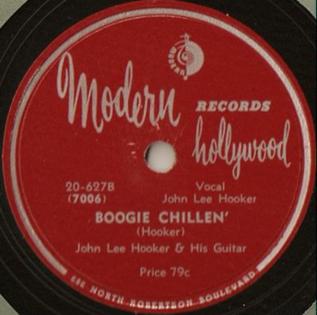Related Research Articles

Hadda Brooks was an American pianist, vocalist and composer. Her first single, "Swingin' the Boogie", which she composed, was issued in 1945. She was billed as "Queen of the Boogie". She sang at Hawaii's statehood ceremony in 1959 and was asked for a private audience by Pope Pius XII.

Eugene Bertram Krupa was an American jazz drummer, band leader and composer known for his energetic style and showmanship. His drum solo on "Sing, Sing, Sing" (1937) elevated the role of the drummer from an accompanying line to an important solo voice in the band.

Michael "Dodo" Marmarosa was an American jazz pianist, composer, and arranger.

Albert Clifton Ammons was an American pianist and player of boogie-woogie, a bluesy jazz style popular from the late 1930s to the mid-1940s.

Pete Johnson was an American boogie-woogie and jazz pianist.
Clarence Smith, better known as Pinetop Smith or Pine Top Smith, was an American boogie-woogie style blues pianist. His hit tune "Pine Top's Boogie Woogie" featured rhythmic "breaks" that were an essential ingredient of ragtime music, but also a fundamental foreshadowing of rock & roll. The song was also the first known use of the term "boogie woogie" on a record, and cemented that term as the moniker for the genre.

Harold Eugene "Gene" Clark was an American singer-songwriter and founding member of the folk rock band the Byrds. He was the Byrds' principal songwriter between 1964 and early 1966, writing most of the band's best-known originals from this period, including "I'll Feel a Whole Lot Better", "She Don't Care About Time", "Eight Miles High" and "Set You Free This Time". Although he did not achieve commercial success as a solo artist, Clark was in the vanguard of popular music during much of his career, prefiguring developments in such disparate subgenres as psychedelic rock, baroque pop, newgrass, country rock, and alternative country.
The origins of rock and roll are complex. Rock and roll emerged as a defined musical style in the United States in the early to mid-1950s. It derived most directly from the rhythm and blues music of the 1940s, which itself developed from earlier blues, the beat-heavy jump blues, boogie woogie, up-tempo jazz and swing music. It was also influenced by gospel, country and western, and traditional folk music. Rock and roll in turn provided the main basis for the music that, since the mid-1960s, has been generally known simply as rock music.

Robert William Troup Jr. was an American actor, jazz pianist, singer, and songwriter. He wrote the song "Route 66" and acted in the role of Dr. Joe Early with his wife Julie London in the television program Emergency! in the 1970s.

"Boogie Chillen'" or "Boogie Chillun" is a blues song first recorded by John Lee Hooker in 1948. It is a solo performance featuring Hooker's vocal, electric guitar, and rhythmic foot stomps. The lyrics are partly autobiographical and alternate between spoken and sung verses. The song was his debut record release and in 1949, it became the first "down-home" electric blues song to reach number one in the R&B records chart.

"Hide Away" or "Hideaway" is a blues guitar instrumental that has become "a standard for countless blues and rock musicians performing today". First recorded in 1960 by Freddie King, the song became a hit on the record charts. It has been interpreted and recorded by numerous blues and other musicians and has been recognized by the Rock and Roll Hall of Fame and the Grammy Hall of Fame.

"Beat Me Daddy, Eight to the Bar" is a song written in 1940 by Don Raye, Hughie Prince, and Ray McKinley. It follows the American boogie-woogie tradition of syncopated piano music.

Dave Alexander, also known as Omar Sharriff, Omar Shariff, Omar Hakim Khayam was an American West Coast blues singer and pianist.

Una Mae Carlisle was an American jazz singer, pianist, and songwriter.
Matthew Michael "Matty" Malneck was an American jazz violinist, songwriter, and arranger.

Dave Green is an English jazz bassist.

"Boo-Woo" is the A-side of the 78-rpm jazz instrumental single recorded on February 1, 1939 by Harry James and The Boogie Woogie Trio.

"Woo-Woo" is the B-side of the 78-rpm jazz instrumental single recorded on February 1, 1939, by Harry James and The Boogie Woogie Trio.

The Drum Battle – Gene Krupa and Buddy Rich at JATP is a 1960 live album by drummers Gene Krupa and Buddy Rich, recorded at a Jazz at the Philharmonic concert at Carnegie Hall in 1952.

Hugh Durham Prince, also known as Hughie Prince, was an American film composer and songwriter. He composed "Boogie Woogie Bugle Boy" with lyricist Don Raye for the movie comedy, Buck Privates, which was nominated for an Academy Award for Best Song in 1942.
References
- ↑ Yanow, Scott (2003). Jazz on Record: The First Sixty Years. Backbeat Books. p. 199. ISBN 978-0-87930-755-4.
- ↑ Silvester, Peter J. (29 July 2009). The Story of Boogie-Woogie: A Left Hand Like God. Scarecrow Press. p. 252. ISBN 978-0-8108-6933-2.
- ↑ Bogdanov, Vladimir; Woodstra, Chris; Erlewine, Stephen Thomas (2002). All Music Guide to Jazz: The Definitive Guide to Jazz Music. Backbeat Books. p. 739. ISBN 978-0-87930-717-2.
- 1 2 Dicaire, David (12 August 2003). Jazz Musicians of the Early Years, to 1945. McFarland. p. 222. ISBN 978-0-7864-8556-7.
- ↑ Reid, John Howard (March 2005). Your Colossal Main Feature Plus Full Support Program. Lulu.com. p. 27. ISBN 978-1-4116-2909-7.
- ↑ "Drum Boogie". The Pittsburgh Courier. 24 January 1942. Retrieved 10 November 2014– via Newspapers.com.CS1 maint: discouraged parameter (link)

- ↑ "Japanese go for JATP". The Pittsburgh Courier. 21 November 1953. p. 18. Retrieved 10 November 2014– via Newspapers.com.CS1 maint: discouraged parameter (link)

- ↑ "Drum Boogie". The Danville Register. 28 November 1971. p. 85. Retrieved 10 November 2014– via Newspapers.com.CS1 maint: discouraged parameter (link)
